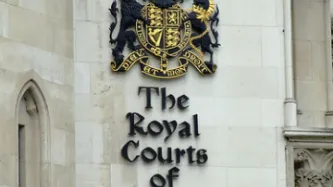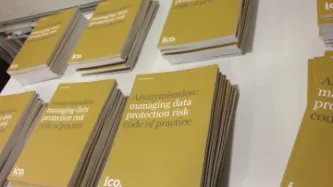Search
Content type: Long Read
Spy agencies have long sought to turn the technologies that improve all our lives against us. From some of the very first forms of remote communications such as telegraph cables, to modern-day means like Skype: if the spies can exploit it, they will.
And, as we’ve learnt over the last few months, the computer and mobile devices that millions of us own and carry around with us every day are no exception to this rule.
The smart phones, laptops, and devices that have changed how we communicate…
Content type: News & Analysis
This post originally appeared on the blog for Association for Progessive Communications, written by Shawna Finnegan and Carly Nyst, for APCNews and Privacy International:
At the 23rd session of the UN Human Rights Council, the UN Special Rapporteur on freedom of opinion and expression, Frank La Rue, released his latest report – an analysis of the implications of States’ surveillance of communications on the exercise of the human rights to privacy and to freedom of opinion and expression.…
Content type: Press release
In the wake of revelations that the UK Government is accessing wide-ranging intelligence information from the US and is conducting mass surveillance on citizens across the UK, Privacy International today commenced legal action against the Government, charging that the expansive spying regime is seemingly operated outside of the rule of law, lacks any accountability, and is neither necessary nor proportionate.
The claim, filed in the Investigatory Powers Tribunal (IPT), challenges the UK…
Content type: News & Analysis
UPDATE: The Guardian has just reported that "The UK's electronic eavesdropping and security agency, GCHQ, has been secretly gathering intelligence from the world's biggest internet companies through a covertly run operation set up by America's top spy agency."
This recent news reveals a long-held suspicion that the GCHQ had the very powers they were seeking to place on a statutory footing with the Snooper Charter, a bill that was knocked back for being unnecessary and…
Content type: News & Analysis
The revelations of the US government's massive and indiscriminate surveillance program are absolutely frightening, putting before the public's eyes the breadth of a secret, dragnet spying regime which casts every US citizen as a suspect.
The unearthing of this top secret court order shows that even in a country that prides itself on checks and balances, and is governed by the rule of law, that government and law enforcement agencies operate within a murky legal framework…
Content type: News & Analysis
In a landmark report, the United Nations today has broken its long-held silence about the threat that State surveillance poses to the enjoyment of the right to privacy.
The report is clear: State surveillance of communications is ubiquitous, and such surveillance severely undermines citizens’ ability to enjoy a private life, freely express themselves and enjoy their other fundamental human rights. Presented today at the UN Human Rights Council session in Geneva, the report marks…
Content type: News & Analysis
Compulsory data on every state school pupil in the country can now be used for research “promoting the education or well-being of children in England”, according to UK Department for Education.
The Department’s response to the highly worrying National Pupil Database (NPD), released in late May, is far narrower than previously suggested late last year, with none of the deeply troubling aspects being included in the final proposals, and existing definitions of terms…
Content type: News & Analysis
We very much welcome today's announcement by Health Secretary Jeremy Hunt that people will be allowed to opt out of having their medical records shared in the NHS England centralised information bank.
The move is an important one for data privacy and patient choice, and has been a key objective of Privacy International in our collaboration with the new medConfidential (which launched yesterday). A month ago, NHS England (and the Director of…
Content type: News & Analysis
After a successful investigation by the US government into the illegal reselling of over a million dollars worth of surveillance equipment to the Syrian regime, Dubai distribution company Computerlinks FZCO has agreed to pay the maximum civil penalty of $2.8 million.
Computerlinks, in three separate transactions between October 2010 and May 2011, sold $1.4 million worth of devices developed by California-based Blue Coat to the state-run Syrian Telecommunications Establishment, which…
Content type: News & Analysis
Out of concern for the potential international ramifications of the Communications Data Bill, fifteen of Privacy International's partner activists and organisations have signed a joint letter urging the UK to consider the detrimental impact this law will have around the world.
The letter reads:
Dear Editor,
The United Kingdom’s proposed Communications Data Bill is not only sinister in its intention to enable the UK government to monitor and control the internet, but it is ill-…
Content type: Press release
Privacy International have filed an application for judicial review of HM Revenue & Customs (HMRC) refusal to release information about the potentially unlawful export of Gamma International's FinFisher surveillance technology.
HMRC has categorically refused to provide any details regarding any investigation into Gamma’s export practices, arguing it is statutorily barred from releasing information to victims or complainants. The law enforcement agency denies that it has any obligation to…
Content type: News & Analysis
"This judgment exposes the widespread and sinister nature of police surveillance of ordinary members of the public in this country. It also acts as a safeguard against the creeping criminalisation of peaceful protest. The Association of Police Officers and Metropolitan Police Commissioner have sanctioned this unlawful conduct for almost a decade and must be made accountable”.
Last week three of the country’s most senior judges in the Court of Appeal found that the Association of Chief Police…
Content type: News & Analysis
A report released today by Citizen Lab has uncovered further evidence that British company Gamma International has sold their surveillance technology FinFisher to repressive regimes abroad, despite having no export licence to do so. The report builds on investigations conducted last year that demonstrated that Gamma International has been exporting FinFisher without a license to repressive regimes with dismal human rights records.
Citizen Lab has uncovered…
Content type: News & Analysis
Nigel Waters attended the APEC DPS meeting in Jakarta as an invited guest. He has previously either formally represented Privacy International or been a part of the Australian delegation. He continues to bring a critical civil society perspective to bear on the APEC privacy work.
The APEC Cross Border Privacy Rules (CBPR) system has moved one step closer to full operation with the acceptance in January 2013 of Mexico as the second participating economy. The United States was accepted in July…
Content type: News & Analysis
The drive for accountability in aid spending has put humanitarian and development agencies under pressure to collect an ever-growing amount of data about those who receive their assistance. Donors also increasingly demand that new technologies are deployed to ensure aid reaches those it is targeted at; preventing people from fraudulently using refugees’ identities, for example, was a key motivation behind UNHCR’s recent introduction of biometric technology to register Syrian…
Content type: Press release
A European privacy group claimed today that dozens of amendments to the new Data Protection Regulation being proposed by Members of the European Parliament (MEPs) are being copied word-for-word from corporate lobby papers, with MEPs frequently failing to even remember their own amendments. Max Schrems, of the website and campaign Europe v Facebook, noticed striking similarities between proposed amendments and lobby papers written by representatives of Amazon, eBay, the American Chamber of…
Content type: Press release
Privacy International has called upon HM Revenue & Customs to investigate potentially illegal exports by the British company Gamma International, which has been exporting surveillance products without a license to repressive regimes with dismal human rights records.
On Friday 9th November, Privacy International's Eric King wrote to HMRC with a 186-page dossier of evidence against Gamma. HMRC is the body responsible for enforcing export regulations and policies set by the Department…
Content type: Press release
Privacy International, the European Center for Constitutional and Human Rights, the Bahrain Center for Human Rights, Bahrain Watch and Reporters without Borders filed formal complaints with the Organisation for Economic Cooperation and Development (OECD) in the UK and Germany against two surveillance companies on Friday 1st February. The British and German National Contact Points are being asked to investigate Gamma International and Trovicor respectively with regards to both companies’…
Content type: Long Read
On 1st February 2013, Privacy International, together with the European Centre for Constitutional and Human Rights (ECCHR), the Bahrain Center for Human Rights, Bahrain Watch and Reporters without Borders, filed complaints with the Organisation for Economic Cooperation and Development (OECD) against Gamma International, a company that exports “FinFisher” (or “FinSpy”) intrusive surveillance software, and Trovicor GmbH, a German company (formerly a business unit of Siemens) which also sells…
Content type: News & Analysis
Today is Data Privacy Day, which commemorates the 1981 signing of the Coucil of Europe's Convention 108, the first legally binding international treaty dealing with privacy and data protection. It is celebrated all over Europe, as well as in Canada and the United States since 2008. To mark the occasion, Privacy International, together with other prominent privacy and digital rights organisations, is launching the Brussels Declaration. It urges Brussels parliamentarians and European…
Content type: News & Analysis
On International Data Privacy Day, it is important that we all ask ourselves: who has access to our personal information? Who can find out where we’ve been and who we’ve called, who can read our emails and our text messages? Who can find which websites we access and which files we download?
Statistics released by Google and Twitter over the past week are a sobering reminder that it is not only the corporations to which we consensually provide this information which are able…
Content type: Press release
Google's latest Transparency Report, released at 3pm GMT this afternoon, shows that requests by European governments for the browsing history, email communications, documents and IP addresses of Google's users have skyrocketed since the Transparency Report was launched three years ago. Countries in the European Union made 7,254 requests about 9,240 users or accounts between July and December 2012, averaging over 1,200 requests a month. This represents over a third of all requests made by…
Content type: Press release
In his response to the third report from the Foreign Affairs Committee Session 2012-13, Foreign Secretary William Hague expressed for the first time the government's firm commitment to putting in place new export controls on "telecommunications equipment for which there is a reasonable expectation that it might be used to restrict freedom of expression on the internet". He added that the government was committed to "working with international partners through the mechanism of the Wassenaar…
Content type: News & Analysis
Privacy International’s campaign for effective export controls of surveillance technology is still ongoing, but for one company, action can already be taken by HM Revenue & Customs to hold stop their unethical practices. Here is the story so far...
Privacy International has been investigating the trade in surveillance technology for almost two years as part of our Big Brother Incorporated project. Our research showed the capabilities of surveillance technology has grown hugely in the…
Content type: News & Analysis
A full analysis of the UK Information Commissioner's "Anonymisation code of practice: managing data protection risk" will take time and working knowledge of how the code is used in practice.
At the launch, the ICO signalled that while they believed the code was now up to scratch, they were open to additions and clarifications given that it is the first document of its kind in the world. We applaud them for this; the code is likely to be copied internationally, so it is particularly…
Content type: News & Analysis
Next week, the European Parliament will make an important decision affecting one of the world’s most vulnerable and stigmatised groups of people: asylum seekers. This decision is part of a larger debate about privacy and function creep, about authorities breaking promises that were made when personal information was collected and using it for new purposes.
EURODAC, a transnational database containing the personal and biometric information of all asylum seekers and illegal immigrants found…
Content type: News & Analysis
Today we launch the public consultation process for the International Principles on Communications Surveillance and Human Rights. From now until January 3rd, we are inviting comments and suggestions on the draft principles.
The rationale behind these principles is to provide civil society, industry and government with a framework against which to evaluate whether current or proposed surveillance laws and practices are consistent with human rights. Now more than ever, we need greater…
Content type: News & Analysis
Last month, US District Judge William Griesbach ruled that police can lawfully install covert digital surveillance cameras on private property without a warrant. Officers of the Drug Enforcement Agency had entered a property belonging to Marco Magana, which was littered with ‘no trespassing’ signs and behind a locked gate, and installed hidden cameras without the consent or knowledge of either the occupant or a court of law. In what has been described by Salon as “yet another…
Content type: News & Analysis
One of the first things that strikes you about the chaotic East African metropolises of Kenya, Uganda and Zimbabwe is the blanket of adverts for mobile phone companies that covers them, from the walls of the immigration hall at Harare airport, to the rickety shacks that line the dusty streets of Kampala. Where official signage is unavailable, DIY versions are painted onto the roofs and walls of houses and small businesses. Stores selling mobile phones are rarely more than a few short steps away…
Content type: News & Analysis
Privacy International is proud to announce our new project, Eyes Wide Open, which aims to pry open the Five Eyes arrangement and bring it under the rule of law. Read our Special Report "Eyes Wide Open" and learn more about the project below.
For almost 70 years, a secret post-war alliance of five English-speaking countries has been building a global surveillance infrastructure to “master the internet” and spy on the worlds communications. This arrangement binds together the US, UK, Canada,…




















